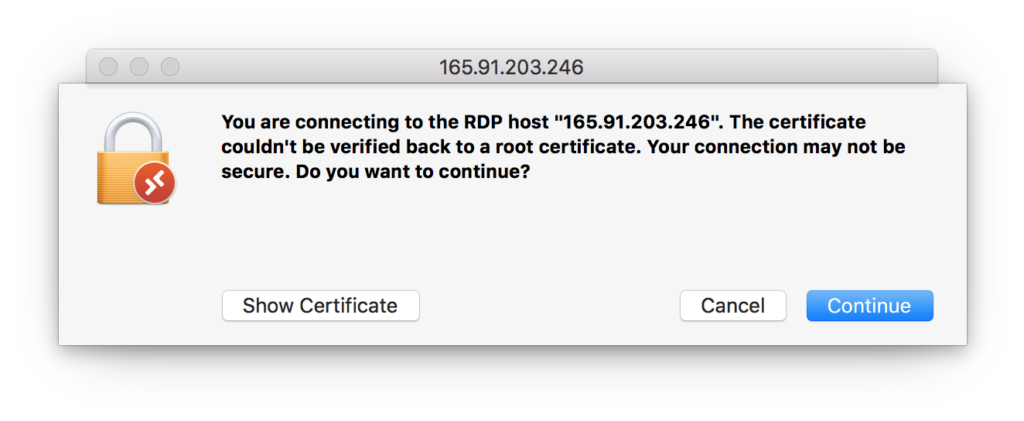

- #Microsoft remote desktop for mac couldn't verify identity how to
- #Microsoft remote desktop for mac couldn't verify identity install
- #Microsoft remote desktop for mac couldn't verify identity upgrade
- #Microsoft remote desktop for mac couldn't verify identity windows 10
- #Microsoft remote desktop for mac couldn't verify identity android
It must be the same one (and the same password) used for the Remote Desktop gateway you’re using for the connection. This information is the PC name you intend to use as the gateway, an IP address, or a domain name.
#Microsoft remote desktop for mac couldn't verify identity install
It’s also what you need to do to access Remote Desktop for Mac successfully.Īfter you have the Enable Remote Desktop option selected and the PC name noted, you’re ready to install the app on your Mac so that you can access those resources.
#Microsoft remote desktop for mac couldn't verify identity android
That means you can use the PC name through another Windows computer, an Android app, or an iOS mobile device. Once you follow these steps, your Windows PC is ready to accept remote connections from any device operating RDP. You might consider changing it to something more user-friendly if you don’t have a way to write it down. You’ll see a menu option called Enable Remote Desktop to select.
#Microsoft remote desktop for mac couldn't verify identity upgrade
Click on it to see what you have and upgrade if necessary. You’re looking for the Edition selection. Go to your Start menu, click on Settings, go to System, and choose the About option.
#Microsoft remote desktop for mac couldn't verify identity windows 10
You will want to be using Microsoft Windows 10 Pro on your PC to get the best results.If you follow these steps in order, you’ll create the first half of the structure you need to use Microsoft Remote Desktop for Mac successfully. Host configuration tool, pick the new certificate and the problem was now solved.Before an Apple MacBook, iMac, or Mac Mini can access the resources on a Windows PC, you must allow a remote connection. So, my solution most familiar to me was to use IIS and create the SSL certificate request, process that with my 3rd party CA, export the certificate with private key and then import that certificate into all of my terminal servers. The SSL connection request has failed." Upon searching the internet for that, I found this page which described the legacy key problem: Supported by the client application are supported by the server. The first one contained the best details and said: "An TLS 1.0 connection request was received from a remote client application, but none of the cipher suites The Terminal Server system event log was showing the following two errors, 3688. Neither the official 2.1.1 client or the 2.1.2 download. The legacy key was not able to be processed correctly by the Mac RDC client. The templateĬhosen was "legacy key", and without boring the rest of the details that part was the root cause of my problem.
#Microsoft remote desktop for mac couldn't verify identity how to
I finally found some instructions on how to create a certificate request using the MMC snap-in, advanced operations, create custom request.

As my Terminal Servers (Remote desktop servers)ĭo not have IIS installed, I was a bit stumped on how to create a new certificate request. But turns out I did, so I had to generate and validate a new one using GoDaddy (though they specifically were not part of the problem).

The certificate had expired and I didn't believe I needed it. The security layer is negotiate and the certificate is the one selected on that screen. However, for me the problem all started when I replaced my SSL certificate that was used/selected in the Remote Desktop Session Host Configuration utility, connections, I too was having the problem same as error on my mac clients (which had previously worked fine).


 0 kommentar(er)
0 kommentar(er)
